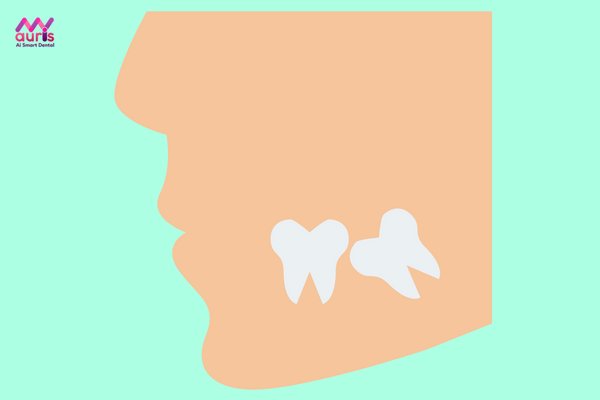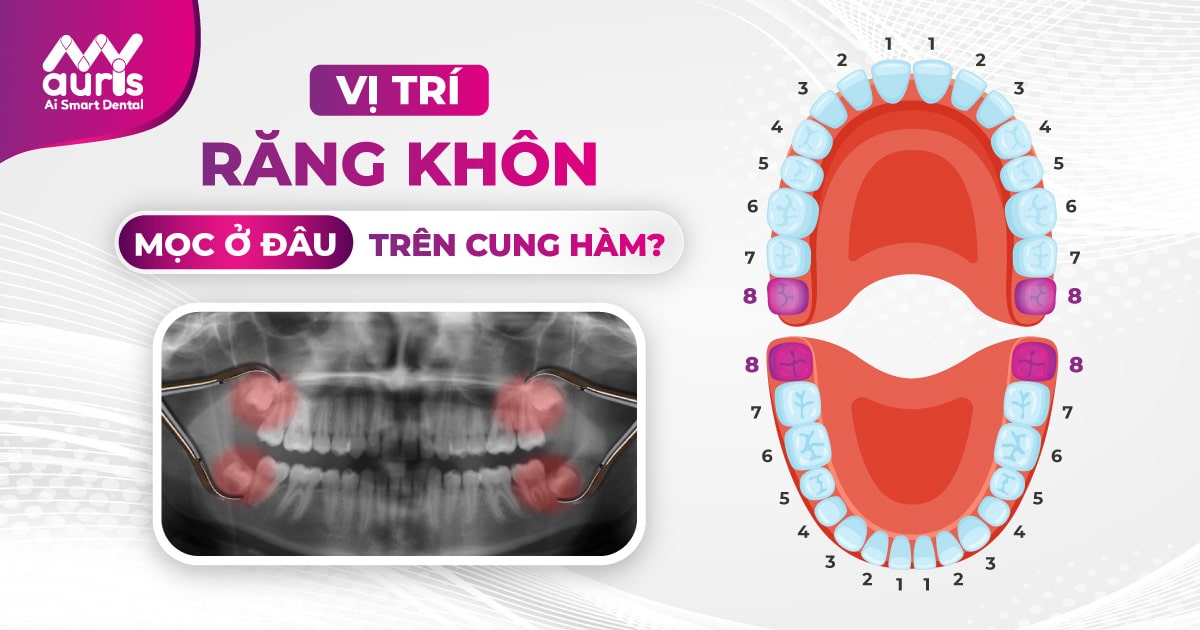At adulthood, everyone is worried that wisdom teeth will affect the ability to chew, live, and sleep because of persistent pain. Therefore, people are interested in the time of eruption as well as the location of wisdom teeth to know how to handle and fix them as soon as possible. To determine the location of wisdom teeth, don’t ignore the useful information in the article.
Position of wisdom teeth
Position of 3rd molar wisdom tooth (also known as tooth number 8 or 3rd molar), the position of wisdom tooth growing in the innermost part of the jaw behind molar number 7. Teeth Wisdom teeth grow after permanent teeth, the last to grow in the jaw at the age of 18-25.
According to dental theory, adults have 32 teeth, of which 4 wisdom teeth grow at the 4 corners of the jaw. However, not everyone grows all 4 teeth, some people only grow 2, or some people grow none. The location and type of tooth growth are also different because it depends on the jaw arch. Some common cases:
- Wisdom teeth do not erupt: if wisdom teeth do not move after adulthood, they may not erupt.
- Wisdom teeth grow straight: very few people have wisdom teeth grow straight, not invasive.
- Impacted and impacted wisdom teeth are the most common and common cases. Symptoms include severe pain, red, swollen gums, and can cause health complications.

Structure of wisdom teeth
Besides the location of wisdom teeth, the structure of wisdom teeth also makes many people curious. Because most of the time, wisdom teeth have just erupted and have been removed, or they have only partially erupted and then stopped growing forever.
In fact, wisdom teeth like other permanent teeth include crowns and roots. The tooth crown is the part above the gum while the tooth root is inserted under the jawbone and is held tightly by periodontal ligaments. Wisdom teeth are teeth with an unstable number of roots. Depends on the position of the teeth.

Wisdom teeth are composed of 3 parts:
- Tooth enamel: the outer layer, that covers the tooth. Tooth enamel is made up of 96% inorganic substances, very hard, able to withstand external forces.
- Dentin: located in the enamel, not as hard as enamel, pale yellow in color, slightly porous and permeable.
- Dental pulp: contains blood vessels, helps transport nutrients to the tooth will have to be removed.
Complications when wisdom teeth grow
As is known, the cases of wisdom teeth growing straight are very few, most of them grow crookedly By the time the 28 permanent teeth have fully developed, the jaw bone stops growing. At the same time, the soft tissue or mucosa has thickened over the teeth, so wisdom teeth often tend to grow underground, which can cause many dangerous complications if not handled and treated promptly. In addition, the position of wisdom teeth is hidden in the jaw, making it difficult to clean, leading to many dental diseases. justify;”>Infection
Infection is a common complication when wisdom teeth emerge. Because the gum area around the tooth is swollen, it allows bacteria to penetrate along with trapped food, causing infection. In some severe cases, pus will appear and cause very severe pain.
The infection can easily recur if not treated promptly. Furthermore, it can also spread to the soft tissues of adjacent teeth or other soft tissues such as the tongue, inner cheeks, etc. The longer the condition lasts, the risk of blood infection can lead to death.
Tooth decay
Tooth decay is a common dental disease, especially where wisdom teeth grow. Wisdom teeth are located deep in the jaw, and can be hidden by the gums, making it difficult to clean. Moreover, teeth that grow crookedly or horizontally can easily cause food to accumulate in the gaps between teeth and around the roots of the teeth. justify;”>If not detected, the cavities gradually grow to form cavities, food continues to get stuck in here and makes the condition worse. If not treated promptly, the cavities will spread to neighboring teeth.
Causes damage to teeth and surrounding soft tissue
Which is the best position for wisdom teeth to grow is always an issue that many people are concerned about. Because they are afraid that they will pierce the 7th molar. However, people’s fears are completely well-founded. When there is not enough room left in the jaw, the wisdom teeth no longer have “land” to grow and will tend to pierce the base or thorax.ridge of molar number 7 (neighboring tooth). Therefore, it will damage this tooth, make it loose, create conditions for bacteria to attack, causing tooth decay.

If you do not check your teeth regularly, you will miss the opportunity to keep tooth number 7. Because the process of damage to tooth number 7 takes place silently, if not detected early, it may be damaged. Affects the marrow, making it difficult to preserve.
In addition, wisdom teeth can also grow out of the cheek, causing damage, scratches, and bleeding of the cheek mucosa.
Mandibular cysts
Infected and inflamed sites with pus abscesses around wisdom teeth are the main cause of jawbone cysts. This condition can develop into pus-filled cysts or tumors. They will destroy the jaw bone structure, damage teeth and affect neighboring teeth.
Sensory disorders
Misaligned or impacted wisdom teeth can cause pressure on the nerves. From there, it leads to loss of sensation in the lips, skin, mucous membranes, etc. At the same time, the process of growing wisdom teeth also causes sympathetic syndrome such as edema, pain on one side of the face, swelling of the cheeks, etc., causing loss of facial aesthetics.
How to handle wisdom teeth growing
If wisdom teeth grow straight, without causing any effects or painful symptoms, teeth can be preserved. As for wisdom teeth that are crooked, impacted, oblique, etc., the doctor will advise you to remove them to protect your oral health.
Before removing wisdom teeth, the doctor must take an X-ray, then perform some necessary tests. This is to determine whether you are eligible to have your wisdom teeth removed. The wisdom tooth extraction process is complicated and dangerous, so it needs to be done at reputable hospitals and dental clinics. From there, it helps to control the condition well, minimizing unwanted risks, especially for people with underlying diseases such as cardiovascular disease, diabetes, hemophilia, etc.

In addition, you should also talk to your doctor for guidanceHow to properly care for your teeth, especially after wisdom teeth extraction.
Understanding where wisdom teeth grow as well as related information is an important factor for people to know how to care for and clean their teeth more thoroughly. To limit risks, wisdom tooth extraction should be performed at a reputable, quality dental clinic. If you are still worried, please contact My Auris dentistry immediately for detailed answers and advice.
Anh Thy





